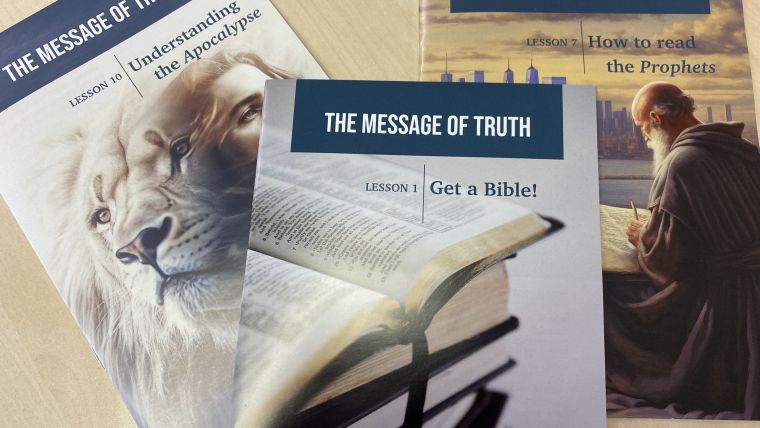The wonders of this universe are too amazing to be accidental. The creatures of our planet are too remarkable to have appeared by chance. Our own abilities are more developed than evolution can explain.
All of this points to a Creator who gave special abilities — and special responsibilities — to humans. The Creation story in Genesis suggests that God gave humans responsibilities to care for the earth and the life on it. He set us up as caretakers for the rest of His creation. And since we would need to depend on Him and on each other, He created beings who must live in relationship with each other.
Besides the special abilities given to humans who were made in the “image of God,” another gift was given in the Creation story in Genesis. It says that “on the seventh day God ended His work which He had done, and He rested on the seventh day from all His work which He had done” (Genesis 2:2).

It’s hard to suggest that the God who created the vast universe would have been exhausted by creating our small planet. Even though we can’t even imagine what it means to “create,” it doesn’t seem like the sort of work that would cause someone to break a sweat or need a break.
Rest
So why would God rest? And why was it important to include this announcement of “rest” in the story? Could it be that this seventh day of rest is not in the story for God, but for humans? Maybe by imitating God’s pattern of six days of creative work and a seventh day devoted to relationships, we are expressing an important aspect of God’s image. Is it possible that when we follow this divine example, we escape the trap of focusing only on surviving — or as we see it today, on making a living?
Think about it. What a wonderful gift that would be! Did God know, for example, that:
- Our problem-solving skills could lead us to work too many hours when the solution didn’t come easily?
- Our creativity would push us to stay up too late and not get enough rest?
- Our self-awareness would lead us to second-guess all our decisions, creating high stress?

Maybe God knew that we would need a time-out every week to recover from the stress of everyday life. Maybe He knew that our relationships would suffer if we didn’t have a built-in reason to stop and dedicate time to them.
If we have one day each week to focus on rest and relationships, we improve our lives in three different ways:
First, we have time to pursue a relationship with our Creator. Amazingly, a Being as unimaginably powerful and creative as He must be, still is focused on relationships — including relationships with humans like us.
Second, our weekly “Sabbath” rest is a time to build social relationships — our connection to those around us. The Sabbath was made for humans, Jesus said, and worshiping on Sabbath includes time with family and time in church.
Finally, Sabbath is a wonderful time for a relationship with the rest of the creation. Spending time in the outdoors gives us an opportunity to rest and recuperate away from the busyness and noise of our daily lives.
What difference does it make?
The Creation story says that God rested on the seventh day. But could it possibly matter which day we rest? What difference does a day make? Surely what matters is setting the time aside for relationship and worship.
Let’s answer that by looking at a story from the Bible book of 2 Kings. Naaman was a commander in the army of ancient Syria (also called Aram) when he contracted one of the most dreaded diseases of the day — leprosy. Not only was leprosy a death sentence; it was a slow and horrible death. (Leprosy is still present in some parts of the world today, but there is effective treatment.)

The disease causes sores on the skin and damage to nerves. In those days, with no treatment available, it led to deformed hands and feet, as well as horrible skin growths. And if the disease wasn’t bad enough, anyone with leprosy was considered “unclean” or contagious. They had to separate themselves from their family and friends and either live alone or with other lepers. It was not just a physical death sentence — it was a social death sentence and seen as a punishment of the gods.
Naaman, a powerful and important leader in the army, was desperate to find some cure before others became aware of his disease and shunned him.
At that time, Syria was one of the dominant nations in the area and although open war had not been declared with the Israelites (also called Hebrews), there were ongoing raids on the Hebrew towns. In fact, there was a Hebrew slave girl working in Naaman’s home as his wife’s maid. Naaman’s wife must have treated her well because when she heard about the disease, she said, “If only master Naaman could see the prophet in Samaria. He can cure leprosy.”
Samaria was the capital of Israel, deep inside enemy territory! But Naaman was desperate, so he went to his king and requested permission to visit Samaria. The king didn’t want to lose such a valuable military leader. So he sent a letter — and a great deal of gold and silver — to King Joram of Israel saying, “I am sending my servant to you. Please have him healed.”
King Joram knew that leprosy was incurable. He could only see a plot. This Syrian king just wants to blame me when Naaman dies. Then he’ll attack us with his army! He stood up and ripped his robe. “Am I God to decide who lives or dies?” he shouted.
Naaman was ready to give up and go home, but the prophet Elisha heard what the king had done. He sent a message saying, “Why are you so upset? Send the man to me and the Syrians will learn that there is a real prophet in Israel.”
When Naaman and his entourage arrived at Elisha’s house, he expected the prophet to perform a healing ritual or make a sacrifice to the gods. But Elisha’s servant Gehazi appeared at the door alone. He passed on Elisha’s instruction: “Go and wash yourself in the Jordan River seven times. Then you will be healed.”

“What?!” Naaman was already mad that the prophet hadn’t even bothered to step outside and meet him. Instead, Elisha orders him to wash in a dirty river! “If washing would do any good, why wouldn’t I wash in the rivers of Syria?” Then he stomped off and headed for home.
Naaman was asking, “What difference does a river make?” Water is water, so why should it matter? If Elisha’s God wants me to dip in water, then it’s the dipping that counts, not the river in which I dip. But there was something Naaman didn’t know.
“Master,” one of Naaman’s servants called, “if the prophet had asked you to do something difficult or dangerous, you would have done it. Can it hurt to try dipping in the Jordan River?”
So Naaman turned toward the river and did as Elisha instructed. Seven times he dipped himself under the water and when he rose up the last time, his leprosy was gone!
Why did it matter which river Naaman dipped in? First, it was a test to show whether or not he really believed in Elisha and the power of Elisha’s God. Second, there was something different in the Jordan River — something that wasn’t in the rivers of Syria (see 2 Kings 5).

Stones of blessing
Several hundred years before Naaman’s time, when the Hebrews who escaped from Egypt finally made it to the land of Canaan, they were stopped by the Jordan River. The river was flooding and there was no way to cross. According to the Bible book of Joshua, God commanded that the priests who were carrying the sacred ark of the covenant to wade out and stand in the middle of the river.
When they did, the flow of the water stopped! As the priests stood in place, the north end of the river piled up behind them as the south end flowed away and dried out. After all the people had crossed, God directed them to stack twelve river stones at the spot where they had crossed. It was an endless reminder that their God — their Creator God — had touched the waters of the Jordan River and opened the way for them. Those stones are still there today.

The water of the Jordan River did have a special blessing that the rivers of Syria didn’t have. God had touched that water in a special way many years before. It wasn’t the water or the rocks that healed Naaman, but the blessing of the Creator whom Elisha worshiped.

A special day
Now back to our question: If God gave us a gift — one day in seven to rest — because of the other special gifts we have, does it matter which day we rest, which day we worship on?
The seventh day is special for two reasons:
First, the Creation story says, “the seventh day.” Like the story of Naaman that doesn’t say, “Dip in a river, any river will do,” it doesn’t say, “God rested on a day, any day.” It says “the seventh day.”
The Bible’s Ten Commandments in the book of Exodus chapter 20 make it even more specific. It says, “Six days you shall labor and do all your work, but the seventh day is the Sabbath of the LORD your God. . . . For in six days the LORD made the heavens and the earth, the sea, and all that is in them, and rested the seventh day. Therefore the LORD blessed the Sabbath day and hallowed it.”
When Naaman dipped himself in the Jordan River, he showed that he believed in Elisha’s God. When humans rest on the seventh day, we show that we believe in the God of creation.

Second, like the Jordan River was blessed by the touch of God when the Hebrews crossed over, the seventh day was blessed by the touch of the Creator. There is a special blessing for those who keep it, just as there was a special blessing for Naaman in the waters of the Jordan River.
In the Creation story, the rest on the seventh day is just as much a part of the record as is the creation of birds on the fifth day or the animals on the sixth day. The Sabbath rest was part of a package of gifts given to humans. Humans were given responsibilities that would cause stress, and problem-solving skills that would bring pressure. But in the same act of creation that brought them into being, they were given a counter-balance, a gift that could off-set the problems those gifts might bring.

Conclusion
There’s no doubt that humans are different than other species on earth. If we are more than just advanced apes, more than just smart monkeys, then maybe we are part of a plan to fill the earth with life and care for it. If we were created “in the image” of the God who created the universe, what does it mean?
The wonders of the universe are beyond imagination. Is it possible that a Being with that kind of power cares about humans? That a Creator God gave us special gifts like self-awareness and creativity? And that He gave us a gift of time off to keep those gifts in balance?
But there are still questions that need to be answered. If God created our world, and if He cares about humans, then why do so many bad things happen to us? Why is there pain and suffering in the world?
The content of this post is taken from Beyond Imagination — There is more to life than we know, by John T. Baldwin, L. James Gibson and Jerry D. Thomas.





